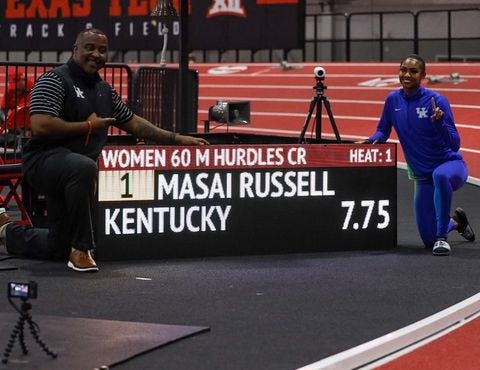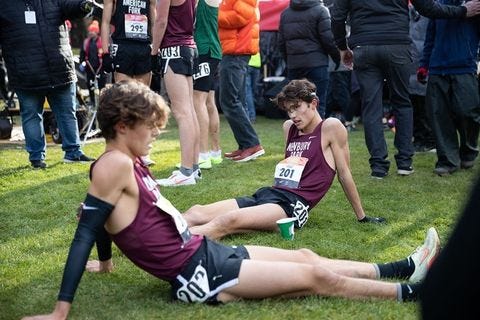Week in Review: Collegiate record binge continues
Russell and Alfred lower bests in women's 60-meter hurdles and 60-meter dash during week that includes plenty of cross country action
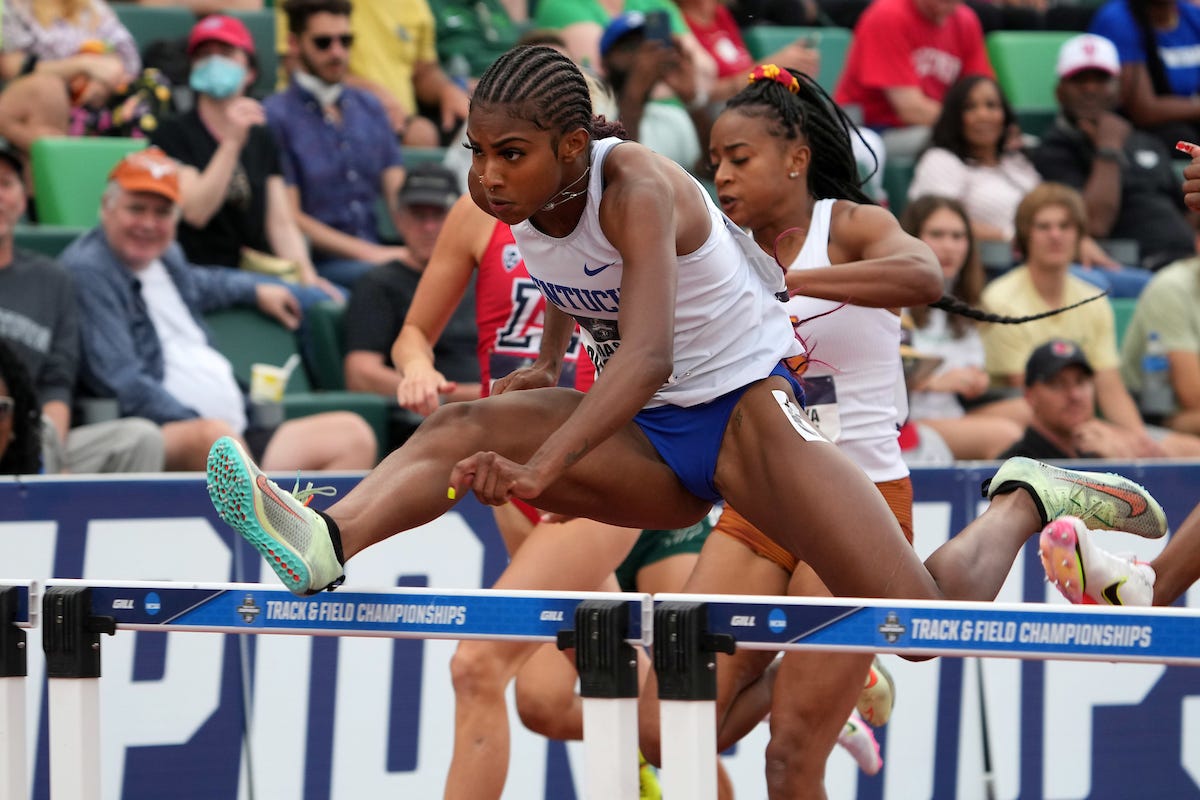
It’s safe to say we’re in a golden age of collegiate hurdling.
The U.S. Track & Field and Cross Country Coaches Association tweeted that last Friday after Masai Russell of the University of Kentucky had set a collegiate record in winning the women’s 60-meter hurdles in the Red Raider Invitational at Texas Tech University.
Taking advantage of the elevation of nearly 1,000 meters (3,280 feet) in Lubbock, Texas, Russell ran 7.75 seconds in the final to trim three-hundredths of a second off the previous collegiate record of 7.78 first set by Brianna Collins-McNeal of Clemson in 2013 and tied by Grace Stark of Florida in winning the NCAA indoor title last year.
Russell’s time smashed her previous personal best of 7.88 that she had set in winning the Rod McGravy Memorial meet in Lexington, Kentucky six days earlier. It also moved her into a four-way tie for 12th on the all-time world performer list in the event.
“Wow..” Russell began in an Instagram post about her collegiate record. “I would say this took forever, but this is perfect timing. God is amazing. Have faith in your ability. Trust YOUR process. Thank you all for the numerous amount of support 🫶🏽 Thank you Lord 🙏🏽”
The 5-foot-5 Russell had hoped to perform well enough in the NCAA Championships and the USA Track & Field Outdoor Championships last June to be offered a shoe contract and turn professional. But when an offer to her liking did not materialize, she decided to go with her Plan B and enrolled in a one-year graduate program in Sports, Recreation and Management at Kentucky so she could use her final year of collegiate eligibility and continue to train under the watchful eyes of Wildcat coach Lonnie Greene.
Russell is one of four women who have run times during the last two seasons that rank them among the five fastest collegiate 60-meter hurdlers of all-time, thus prompting the aforementioned tweet from USTFCCCA.
Alia Armstrong of LSU is one of the others.
The Tiger junior ran 7.81 in the 60 hurdles last year and was favored to win the NCAA indoor title, but she was disqualified from the final after she was called for a false start. Stark proceeded to tie what was then the collegiate record in the race that followed, with Russell finishing second in 7.95.
However, there was no collegian who could keep pace with Armstrong in the 100-meter hurdles during the outdoor season. She ran 12.57 to win the NCAA title – Russell was third in 12.81 – before placing third in the USA Track & Field Outdoor Championships in a then-personal best of 12.47, and finishing fourth in the final of the World Athletics Championships in Eugene, Oregon in a wind-aided 12.31 after lowering her best to 12.43 in a semifinal.
All of those performances led to a No. 7 world ranking by Track & Field News, as well as her inclusion on the women’s preseason watch list for the Bowerman Award for 2023.
Now Armstrong is scheduled to run in her first 60-meter hurdle races of the year on Saturday in the Razorback Invitational at the University of Arkansas.
Kentucky is also scheduled to compete in the two-day meet that starts tomorrow, but Russell is entered in the women’s 200 and 60-meter dash.
The first time Armstrong, Russell, and Stark are expected to race each other will most likely be in the Southeastern Conference Championships at Arkansas from February 24-25.
That should be a fun race to watch.
Another collegiate best: Julien Alfred of Texas set the fourth collegiate record of the young indoor season on Saturday when she won the women’s 60-meter dash in 7.02 seconds in the Dr. Martin Luther King, Jr. Collegiate Invitational in Albuquerque, New Mexico.
Competing in the same Albuquerque Convention Center venue that will host the NCAA Indoor Championships, the senior from Saint Lucia benefitted from the nearly 5,000-foot (1,525 meters) elevation while trimming two-hundredths of a second off the collegiate record of 7.04 that she set in a semifinal of the NCAA meet last year.
The defending NCAA champion in the 100 had indicated a record was possible when she ran 7.05, then equal to the second-fastest time in collegiate history, in her qualifying heat earlier in the meet.
She got off to her typical quick start in the final and powered away from the field as sophomore teammate Rhasidat Adeleke of Ireland finished second in 7.20, followed by Maboundou Kone of Ivory Coast in 7.21.
Alfred later ran a solid 22.71 in the 200, but that left her in second place behind Adeleke’s Irish indoor record of 22.52.
Fast times continue: The 600-meter run, although not contested at the conference or national-championship level, has been the hottest event during the early part of the indoor collegiate season.
The latest top performances came in the MLK meet when Texas senior Kennedy Simon and Georgia freshman Will Sumner won the women’s and men’s events, respectively.
Simon, third in the 400 in the NCAA Championships last year, ran 1:26.69 while turning back Baylor junior Lily Williams, who finished in 1:27.57.
Simon’s time moved her to fourth on the all-time collegiate performer list and Williams’ effort ranks 10th. They came a week after Arkansas sophomore Britton Wilson had set a collegiate record of 1:25.16 in the 600 while finishing second to fellow American Shamier Little (1:24.65) in the Arkansas Invitational.
Sumner, who ran 45.78 in the 400 and 1:46.53 in the 800 as a senior at Woodstock High School in Georgia last year, clocked 1:15.32 in the 600 in Albuquerque to turn back the Texas duo of grad student Jonathan Jones (1:15.72) in second place and sophomore Yusuf Bizimana (1:15.79) in third place.
Sumner moved to eighth on the all-time collegiate performer list with his effort and Great Britain native Bizimana now ranks 12th.
The performances from that pair and Jones of Barbados came a week after Arkansas senior Christopher Bailey ran 1:15.18 to win the Arkansas Invitational and move to sixth on the all-time collegiate list.
Crashing the party: When it came to the men’s 400 meters in the MLK meet, a lot of people were expecting the battle for first place to be between Georgia teammates Eija Godwin and Matthew Boling.
Godwin had finished third and fourth, respectively, in the NCAA and USA Track & Field Outdoor championships last year before running four high-quality 1,600-meter relay legs in the World Championships in Eugene. Boling had finished second in the 200 in the NCAA meet and was coming off a 32.40 clocking in the 300 meters on Jan. 14 that had moved him to third on the all-time collegiate performer list.
But it was USC junior Ashton Allen who won the event as his first-place time of 45.94 in the fourth section topped the 46.09 and 46.13 clockings which Godwin and Boling produced while racing against one another in the first heat.
Allen, who ran the third leg on USC’s NCAA champion 400-meter relay team last year, was a 200-400 sprinter in high school with bests of 20.84 and 46.99. However, he focused on the 100 and 200 last season while lowering his personal bests to 10.34 and 20.71 in those events.
His performance on Saturday makes me think he could be running the 400 more often this year.
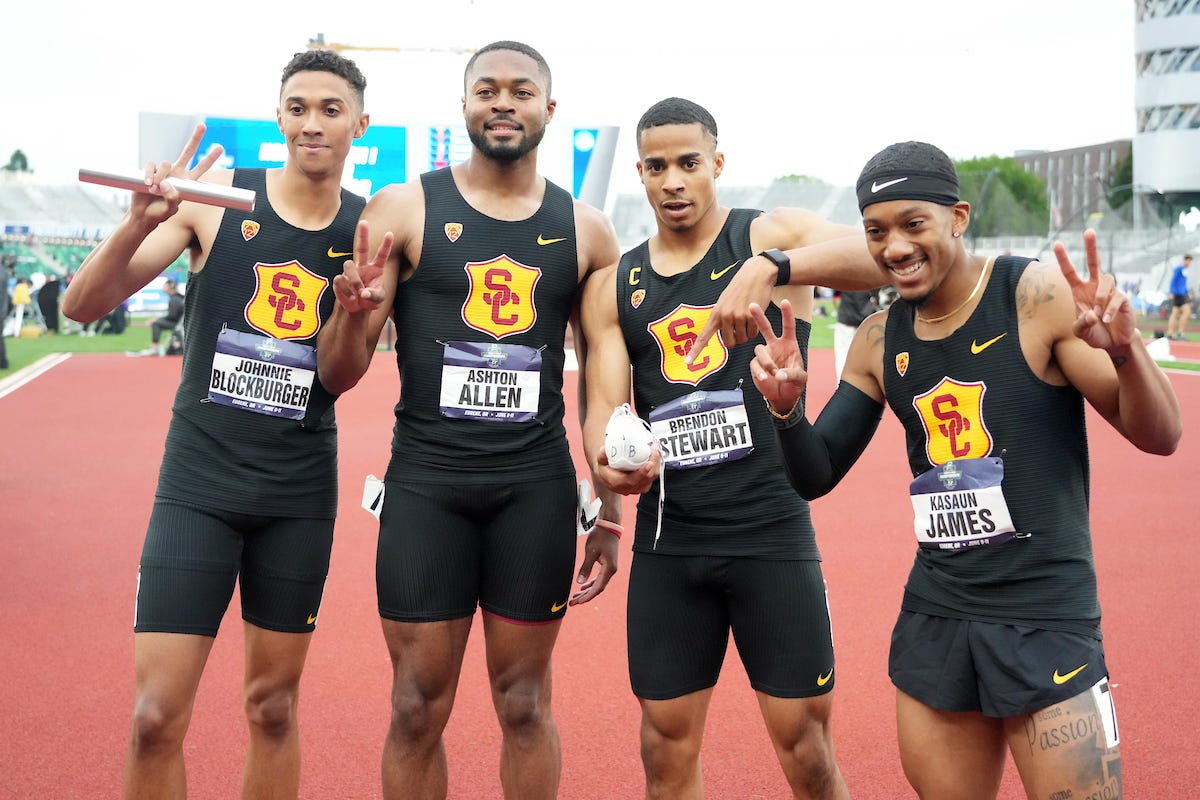
Hurdlers lead the way: Freddie Crittenden and Alaysha Johnson, members of depth-laden U.S. pools in the straightaway hurdles outdoors last year, turned in the top two performances in winning their respective events in the American Track League’s Hawkeye Pro Classic in Iowa City, Iowa, on Saturday.
The 28-year-old Crittenden ran 7.53 seconds in the 60-meter high hurdles to squeak by fellow American Michael Dickson, who was credited with the same time.
Crittenden’s time tied the personal best he first ran in 2019 and Dickson’s time also equaled the career best he initially set in 2019.
Johnson ran a personal best of 7.84 to win the women’s 60 hurdles and finish five hundredths of a second in front of second-place Devynne Charlton of the Bahamas, the silver medalist in the event in the World Indoor Championships in Belgrade, Serbia last March.
Supreme depth: As alluded to in the previous note, 2022 was a strong year for the U.S. in both straightaway hurdle events last year.
American men, led by top-ranked Grant Holloway and No. 2-ranked Trey Cunningham, took seven of the top 10 places for the year as determined by Track & Field News.
In addition to that pair, Devon Allen was ranked fifth, with countrymen Daniel Roberts seventh, Freddie Crittenden eighth, Jamal Britt ninth, and Eric Edwards 10th.
U.S. women were shut out of the medals in the 100-meter hurdles in the World Championships last July, but they still ended up with the No. 4-8-ranked competitors in Keni Harrison, Tia Jones, Alaysha Johnson, Alia Armstrong, and Tonea Marshall.
Blanket finish: Kendal Williams won a close men’s 60-meter dash in the RADD Collegiate Invitational at the Alachua County Sports Complex in Gainesville, Florida, on Saturday when his 6.59-second clocking edged the Lyles brothers as Josephus ran a personal best of 6.60 in finishing second and Noah timed 6.61 in third.
The 27-year-old Williams ran his personal best of 6.51 in the 60 in 2017 and two-time defending World 200-meter champion Noah Lyles clocked a career best of 6.55 last year.
Sprinter on the rise: I have to admit I knew little, if anything, about sprinter Colby Hilton prior to last weekend. But after he won the men’s 60-meter dash in 6.51 seconds in the University of Colorado at Colorado Springs Invitational on Saturday I figured I needed to find out more about him.
Here’s what I’ve come up with.
He graduated from Marshall High School in Minnesota in 2016 and was selected as the Summit League Most Outstanding Championship Performer as a senior at South Dakota State University in 2021 after he won his second consecutive title in the 100 and 200 meters in the league meet.
After running 10.99 in the 100 and 22.24 in the 200 in 2017, he improved to 10.57 and 21.94 in 2018, 10.41 and 20.92 in ’19, 10.37 and 20.57 in 2021, and 10.14 and 20.56 last year while running unattached.
He advanced to the quarterfinals of the NCAA Preliminary West Round in the 200 in 2021, but he was eliminated in the heats of the 100.
He ran in the 100 in the USA Track & Field Outdoor Championships last year, but was eliminated in the first round as his 10.37 effort left him with the 23rd fastest time among the 30 competitors.
He ran his personal bests of 10.14 in the 100 and 20.56 in the 200 last year in a May meet in Colorado Springs, where the elevation of just over 6,000 feet (1,829 meters) no doubt aided his performances. He ran the second-best 100 time of his career in the Mt. San Antonio College Relays last April when he clocked 10.33 to finish sixth in the final of the college-open division race won by Davonte Burnett of USC in 9.99.
He began the indoor season with a 60 best of 6.62, which was also run in the sprint-friendly altitude of Colorado Springs.
Nonetheless, his 6.51 clocking on Saturday – which came after a 6.64 run in qualifying heat earlier in the day – moved him into a tie for the fastest time in the world this year and has me looking forward to his next meet to see what he does.
Slipping and sliding: Frenchman Yann Schrub and Eritrean Rahel Daniel won their respective men’s and women’s races over a snow-covered course in the CrossCup in Hannut, Belgium on Sunday.
The 26-year-old Schrub, seventh in the European Cross Country Championships in December, was one of four runners who had broken away from the pack after the third of three 1,000-meter loops.
The lead group was reduced to three when Kenyan Gideon Rono Kipkertich dropped off the pace at the midway point.
Schrub and Belgians Isaac Kimeli and Guillaume Grimard ran together for another 1,500-meter loop before it was down to Schurb and Kimeli, the bronze medalist in the European Cross Country Championships.
Schrub had a five second-lead on Kimeli as he began the last 1,500-meter lap and he would expand his advantage to 19 seconds as he crossed the finish line in 28:29 to Kimeli’s 28:48.
Grimard finished third in 28:59, followed by Rono in 29:07. The 19-year-old Rono had won the Cinque Mulini in San Vittore Olona in Italy a week earlier.
“My legs felt wonderful today,” Schrub said in a post on the World Athletics site. “I knew I was in good shape after a period at the end of last year when things did not feel completely right.”
He added that he did not feel like he had to defeat Kimeli to make up for the results of the European Championships.
“It did not feel like revenge. . . . I respect him a lot as an athlete, given his track record, and today was a nice battle for sure. But most of all I’m happy to take the win here, especially with the lovely feeling I had in my legs.”
While Schrub’s victory was his first in a World Cross Country Tour gold-level event this season, Daniel overcame a fall midway during the women’s race to record her third win without a defeat.
The 21-year-old runner was part of a lead group that also included Sweden’s Sarah Lahti and Great Britain’s Megan Keith for the first 2,000 meters of the 8,000-meter race. But after Daniel lost her footing about three kilometers in, the leading trio had become a quartet with the Netherland’s Veerle Bakker joining the group.
Daniel, fifth in the 10,000 in the World Championships last July, took the lead with 4,500 meters left in the race. But Lahti did not let her get away and Keith, the silver-medalist in the European U23 (under 23) race, was the one pushing the pace during the second-to-last 1,500-meter loop.
After Daniel and Lahti had dropped Keith, Daniel was able to break away from Lahti and cross the finish line in 28:41. Lahti finished second in 28:45, followed by Keith in 28:49 and Bakker in 28:58.
"The snow and mud made it very difficult today,” said Daniel. “I really had to dig deep to grab the victory. Halfway I crashed, yet I don’t feel any pain.”
Daniel will next compete in the World Cross Country Championships in Bathurst, Australia on Feb. 18.
“I feel ready for my next race,” she said. “I'm excited for my trip to Australia.”
The World Cross Country Championships began in 1973 and were held annually through 2011 before switching to a once-every-two-years format that began in 2013.
The 2021 meet was cancelled due to the COVID-19 pandemic and the rescheduled meet was again cancelled last year due to a spike in the rate of the virus in Australia.
Letting it rip: Ruth Chepngetich has been known to throw caution to the wind when it comes to her racing tactics and she did so again in winning the women’s race of the Kenyan Cross Country Championships at the Kenyan Prisons Training College in Ruiru on Saturday.
The 28-year-old, who ran the second fastest women’s marathon in history with her time of 2 hour 14 minutes 18 seconds in Chicago last October, had strung out the field with a quick opening kilometer and she had a lead of about 150 meters halfway through the 10,000-meter race.
However, Sheila Chepkirui, who ran 2:17:29 to place third in the Valencia Marathon in Spain in early December, made up large chunks of ground during the second half of the race and finished only two seconds back of Chepngetich’s winning 32:56 clocking.
Zena Chemutai placed third in 33:06.
Chepngetich raced in the mixed relay less than an hour later and anchored her team to a come-from-behind victory.
The men’s race was a much closer affair than the women’s as close to a dozen runners were in the lead pack at the halfway point of the 10,000-meter race before a quickening tempo reduced the group to seven.
The race eventually came down to a battle between Charles Katul Lokir and Isaac Kibet, with Lokir edging past his countryman just before the finish as both of them were credited with times of 29:16.
Although Kenya held its trials race for the World Cross Country Championships in December, the national championships served as a selection meet for the Sirikwa Classic, a World Cross Country Tour gold-level event that will be held in Eldoret on Feb. 4.
First-time champions: Emmanuel Bor and Edna Kurgat won their first national titles in the USA Track & Field Cross Country Championships on Saturday with dominating performances in the men’s and women’s races that were contested at Pole Green Park in Mechanicsville, Virginia.
The 34-year-old Bor had a small lead over his younger brother, Hillary Bor, when he came through three kilometers in 8:42.7 and his advantage was nearly three seconds over second-place Leonard Korir when he passed the halfway mark in 14:23.0.
It had grown to just under 12 seconds when he came through eight kilometers in 23:03.4.
The chase pack, led by Andrew Colley, made up a lot of ground on Bor in the final two kilometers of the race, but his winning time of 28:44 gave him a four-second margin of victory over second-place Colley, who finished in 28:48. He was just in front of Anthony Rotich, Korir, Sam Chelanga, Dillon Maggard, and Reid Buchanan, who were all credited with times of 28:49.
The top six finishers qualified for the U.S. team that will run in the World Cross Country Championships in Bathurst, Australia on Feb. 18, although seventh-place finisher Buchanan could be named to the team if any of the top six finishers were to decline their spots.
In contrast to the men’s contest, the 31-year-old Kurgat was content to run in the lead pack for the first 7½ kilometers of the women’s race before starting to break away from it just before hitting the eight-kilometer mark in 28:58.1.
Her lead of nearly two seconds at that point had grown to more than 11 seconds at nine kilometers (29:03.8) and she had a 17-second margin of victory when she finished in 32:07.
Makena Morley placed second in 32:24, followed by Emily Durgin in 32:27.
Prep winners: Irene Riggs of Morgantown High School in West Virginia and Leo Young of Newbury Park High in California, whose fall cross country seasons ended in decidedly different fashions, won the women’s and men’s U20 (under 20) races in the USA Track and Field Cross Country Championships on Saturday.
Riggs, who capped an undefeated prep season with a dominant victory in the girls’ race of the Nike Cross Nationals in Portland, Oregon on Dec. 3, clocked 19:45 over the 6,000-meter course to finish three seconds ahead of Ellie Shea of the Emerging Elites club in Waltham, Massachusetts and 20 seconds up on sophomore Zariel Macchia of Floyd High in Mastic Beach, New York.
Senior Karrie Baloga of Cornwall Central High in New Windsor, New York finished fifth in 20:07 after concluding her fall season with a six-second victory over Shea in the Champs Sports Championships on Dec. 10.
Young had faded from first place to 11th in the final 350 meters of the Nike Cross Nationals after pushing the pace for most of that race which was held in cold, breezy conditions. But he bided his time on Saturday while running in his first cross country race of more than 5,000 meters.
He was in 17th place after the first kilometer and in 14th when he came through two kilometers. But he was only a second and half back of leader Evans Jenkins when the University of Washington freshman led a nine-runner lead group through five kilometers in 15:01.9.
Though Young led a six-runner pack though six kilometers in 18:01.5, he was in fourth place, a half second off the lead when Villanova University freshman Marco Langon came through seven kilometers in 21:01.3.
Young was content to let Langon and Wisconsin freshman Micah Wilson slug it out for much of the last kilometer before surging into the lead on the last uphill portion of the course with about 300 meters remaining.
His winning time of 23:47 left him well clear of second-place Wilson and third-place Langdon, who each ran 23:54.
Champs Sports boys’ winner Kole Mathison of Carmel High in Indiana, and Young’s twin brother, Lex, who were among the lead group for the first five kilometers, placed seventh and 12th in 24:12 and 24:26, respectively.
It was a very satisfying victory for Leo Young, who had posted the following text on Instagram after his subpar performance in the Nike Cross Nationals race that was won by senior teammate Aaron Sahlman.
“You win some, you lose some. Despite the result, always give your all. Sometimes the risk doesn’t yield the desired reward, and in those moments it’s important to keep your head up, remember your value and keep on grinding. There are always big things ahead when you commit yourself to your cause.”
A well-deserved honor: Paul Tergat, one of only two men in history to win five consecutive men’s long-course titles in the World Athletics Cross Country Championships, has been announced as the ambassador for the 44th edition of the meet that will be held in Bathurst, Australia on Feb. 18.
Tergat won consecutive men’s individual titles from 1995-99 while leading Kenya to its 10th, 11th, 12th, 13th, and 14th team titles in a row.
“Cross country will always be a special event in my athletics career,” Tergat said in a World Athletics post. “It evokes very nostalgic and fond memories, because this is really where my long athletics career was birthed, developed and blossomed, with the crowning of five straight World Cross Country Championships titles between 1995 and 1999.
“In cross country running, I picked up lifelong lessons after conquering diverse conditions, twists and turns, terrains, wetlands and barriers that define the athletics event.”
Tergat was also a superb competitor on the track and roads.
He won silver medals in the 10,000 meters in the 1996 and 2000 Olympic Games and in the 1997 and ’99 World Championships.
In addition, he was also the first man in history to break 26 minutes 30 seconds in the 10,000 when he ran 26:27.85 in the Memorial van Damme meet in Brussels in 1997, as well as the first man to run under 2 hours 5 minutes in the marathon when he clocked 2:04:55 in Berlin in 2003.
False start: I appear to have jumped the gun when I wrote in a Dec. 14 post that the make-up of the Ugandan men’s team that will run in the World Cross Country Championships in Bathurst, Australia on Feb. 18 would be completely different than the one that won its first team title in the 2019 meet in Aarhus, Denmark.
That became apparent last week when it was announced that Joshua Cheptegei and Jacob Kiplimo, who finished 1-2 in the men’s race in 2019, would be on the Ugandan team competing in Bathurst.
I was under the impression that last month’s national championships in Uganda had been the qualifying meet for the World Championships, with the top six finishers in each race comprising the teams that would compete in Bathurst. When neither Cheptegei, who was coming back from a knee injury, and Kiplimo, who was a late withdrawal, ran in the meet, I figured they would not run in Australia.
Their inclusion should give Uganda a huge boost in its quest for a second consecutive team title as Cheptegei is the world-record-holder in the 5,000 and 10,000, as well as the defending Olympic champion in the 5,000 and defending World champion in the 10,000.
Kiplimo won the bronze medal in the 10,000 in the Olympics in 2021 and in the World Championships last year.
Food for thought: Innes FitzGerald of Great Britain has written a letter to UK Athletics asking not to be considered for a place on the national U20 (under 20) women’s team for the World Cross Country Championships in Bathurst, Australia due to her concerns about the detrimental effects that flying to and from the event could have on the climate.
The 16-year-old FitzGerald was Britain’s top finisher when she placed fourth in the women’s U20 race of the European Cross Country Championships outside of Turin last month.
“When I started running, the prospect of me competing in the World Cross Country Championships would have seemed merely a dream. However, the reality of the travel fills me with deep concern,” she wrote in her letter. “I was just nine when the COP21 Paris Climate agreement was signed. Now, eight years on, and global emissions have been steadily increasing, sending us on a path to climate catastrophe. Sir David King, former government chief scientific advisor, has said, ‘What we do, I believe, in the next three to four years will determine the future of humanity.’ The science is clear. Turning this around is only possible through transformational change from collective and personal action.”
FitzGerald further wrote that she would never be comfortable “flying in the knowledge that people could be losing their livelihoods, homes and loved ones as a result. The least I can do is voice my solidarity with those suffering on the front line of climate breakdown.”
In an effort to lessen her impact on the climate for the European Cross Country Championships, FitzGerald took an overnight train from Britain to Lille, France before catching a train to Turin via Paris.
Champions for Earth, an organization for environmentally-friendly athletes, told Athletics Weekly that FitzGerald is “looking for sponsors and supporters who can help her with the more expensive public transport, accommodation and eco-friendly kit that she requires. It is clear that Innes has the steely determination and focus, combined with the courage and clarity to face a reality quite different to athletes of previous generations.”
Another honor: USC re-named the field at its on-campus track and field facility in honor of Allyson Felix on Jan. 18.
Felix, the winner of 11 Olympic and 20 World Championship medals, signed a letter of intent with USC during her senior year in high school in 2003, but she knew at that time she might forgo a collegiate track and field career to turn professional.
She signed a contract with Adidas later that year, but began attending classes at USC that fall and graduated from the school in 2008 with a degree in Elementary Education. She also received an honorary Doctor of Humane Letters degree from USC in May of last year.
The 37-year-old Felix wrote the following in a post on Instagram: “Allyson Felix Field?!?! Absolutely blown away by this honor. Thank you @uscedu for celebrating me in this extremely special way❤️💛✌🏾”
Felix, who was selected by Sports Illustrated as the recipient of its Muhamad Ali Legacy Award for 2022, was a five-time Olympian and a member of 10 U.S. World Championship teams.
Her first medal at the global-championship level came in the 2004 Olympic Games in Athens when she placed second in the 200 meters as an 18-year-old freshman student at USC.
Her final two medals came in the World Championships in Eugene, Oregon last July. She won a bronze medal after running the second leg on the U.S. mixed 1,600-meter relay team that finished third in the final before being awarded a gold medal after running a leg in a qualifying heat for an American team that went on to win the final track event of the meet.
Allyson Felix Field was previously named Cromwell Field in memory of Dean Cromwell, the coach who guided USC men’s track and field teams to 12 NCAA titles in the 1920s, 30s, and early 40s. The field is at the center of Katherine B. Loker Track Stadium.
On the performance enhancing drug front: Peter Bol, the fourth-place finisher in the men’s 800 meters in the Olympic Games in Tokyo in 2021, has been provisionally suspended by Athletics Australia because an out-of-competition doping control test on Oct. 11 of last year returned what the organization calls an adverse analytical finding for synthetic EPO, which is on the World Anti-Doping Agency’s banned list.
EPO, which is short for erythropoietin, is a performance-enhancing substance that is also produced naturally in the human body as a hormone. Using a synthetic form of it is regarded as blood doping that can improve the endurance of someone taking it.
The 28-year-old Bol, who finished seventh in the 800 in last year’s World Athletics Championships, posted on Instagram, “It is critically important to convey with the strongest conviction that I am innocent and have not taken this substance as I am accused. I ask that everyone in Australia believe me and let the process play out.”
An analysis of the B sample from the test will take place in February.
Bol, who emigrated to Australia from Sudan at the age of 8, is a two-time Olympian and has run in the past three World Championships.
He was the No. 5-ranked 800-meter runner in the world by Track & Field News for 2021, as well as the No. 10-ranked competitor for 2022.
In memory: Bob Hersh, an American who was a member of what is now called the World Athletics Council from 1999-2015, died on Jan. 16. He was 82.
Hersh, a graduate of Columbia University and Harvard Law School, had been a long-time track and field official in the U.S. when he joined the Technical Committee of what was then called the International Amateur Athletic Federation (IAAF) in 1984 and served on it until 1999, when he became a Council member.
He became Vice President of the Council, whose parent name had been changed to the International Association of Athletics Federations, in 2007 and Senior Vice President in 2011, the highest position ever held by an American.
He was involved in the sport in a myriad of ways during his lifetime, working as the English-language P.A. announcer at the Olympic Games from 1984-96, and in 2004 and ’08, as well as announcing nine consecutive World Championships from 1991-2007.
Known for being pragmatic and analytical, one of the first things Hersh did after joining the Technical Committee was to start work toward getting rid of an archaic rule that prohibited coaches from communicating with their athletes from the stands or any other place in a stadium during a meet.
“A coach couldn’t shout instructions to an athlete or use hand signals or hold up a sign,” Hersh said in a 2018 interview with USA Track & Field. “I thought that was absurd. Given the fact that basketball players and football players could go over and talk to the coaches, I just didn't think that made any sense. I was easily able to convince the IAAF to change that rule. Now, of course, they've gone even further by providing coaches seating in the stands, particularly near the field events.”
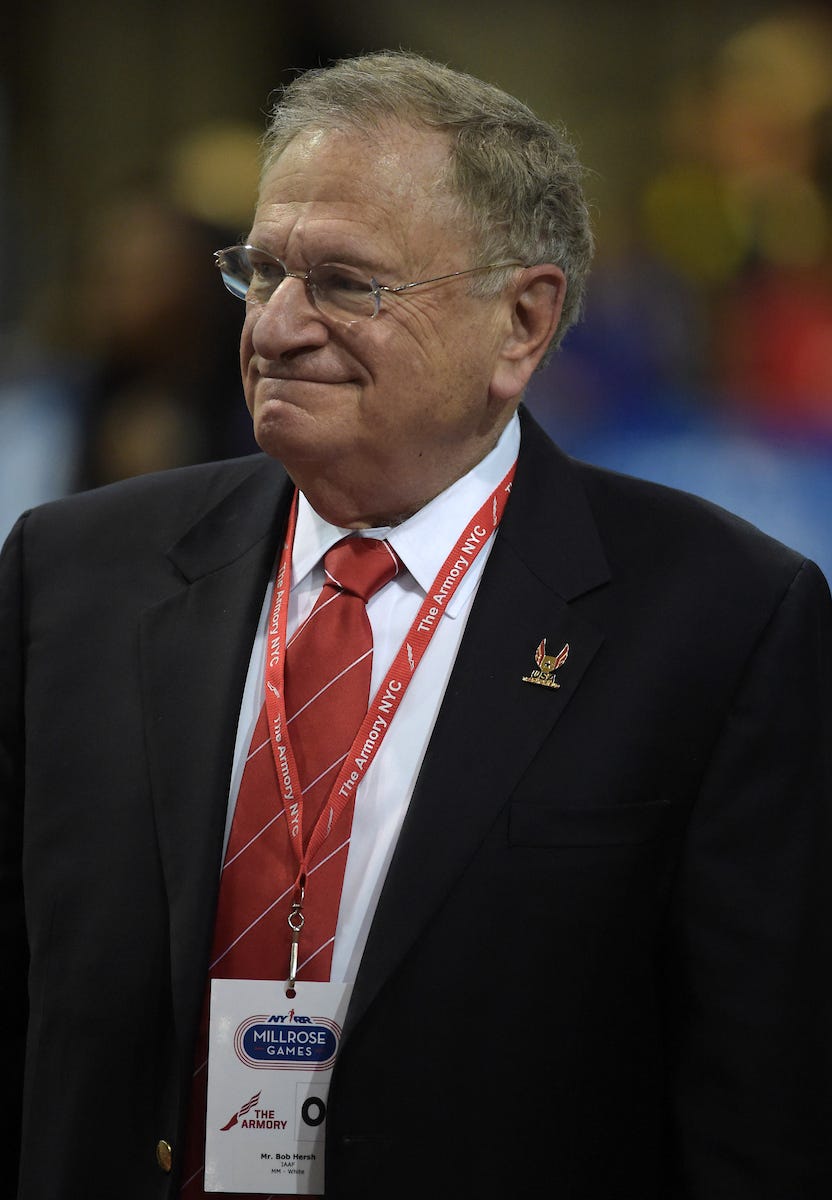
In memory II: Bernd Kannenberg, the 1972 Olympic champion in the men’s 50-kilometer walk for West Germany, died on Jan. 13 in Munster, Germany. He was 78.
Although he did not start high-level training as a race walker until 1969 when he was 27, Kannenberg set a world record of 3 hours 52 minutes 45 seconds in the 50-kilometer walk in Bremen, West Germany in May of 1972.
He then won the Olympic title in Munich in early September with an Olympic record of 3:56:11, then the third-fastest performance in history.
Kannenberg’s victory, which came four days after he had dropped out of the 20-kilometer event, occurred on what came to be called “Golden Sunday” in West German athletics lore. On that day, fellow West Germans Klaus Wolfermann and Hildegard Falck also won gold medals in the men’s javelin and women’s 800 meters, respectively.
Kannenberg was the No. 1-ranked 50-kilometer walker in the world by Track & Field News for the 1972, ’73, and ’75 seasons. He was also ranked among the top 10 walkers in the 20-kilometer event from 1972-75, topped by a No. 2 ranking in ’74.


